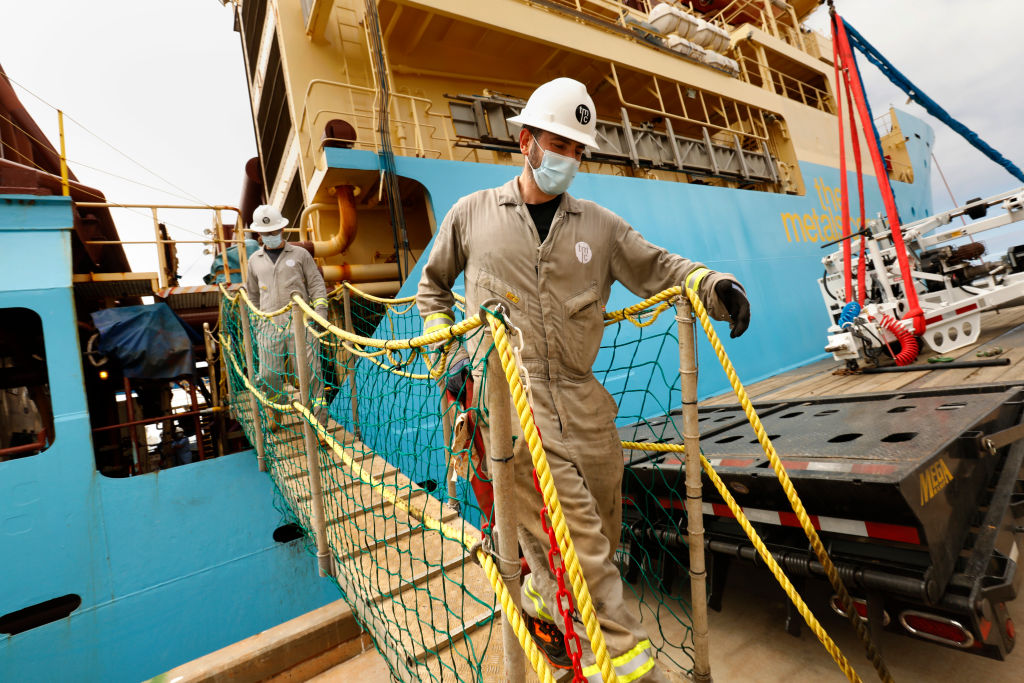
(To get this story in your inbox, subscribe to the TIME CO2 Leadership Report newsletter here.)
At the last minute of the recent International Seabed Authority meeting in Jamaica (which ended July 29), negotiators representing countries around the world decided to postpone a decision on the most important point of debate at the gatherings. That is, whether and how companies can mine the bottom of the ocean for critical minerals needed for the energy transition.
The debate has largely centered on just how bad deep-sea mining would be for underwater life. Opponents say that the practice risks destroying untouched marine ecosystems; supporters argue that the extraction technology is relatively light touch and that any damage underwater would be better than damage to terrestrial ecosystems. It is, at its core, a moral argument with the economic and financial case for deep-sea mining almost taken for granted.
So I want to take a minute here to look at some of the economic and financial elements at play. Deep-sea mining is one of many sectors in the clean technology space that should make businesses and investors think differently about risks and returns.
Read more: This Mining Executive Is Fighting Her Own Industry to Protect the Environment
Deep-sea mining is a high-risk, high-reward investment. The technology is unproven, and some experts have argued it will be too expensive to compete in the current rare-earth-mineral marketplace. This could very well mean financial devastation for the companies that pursue it. Still, it seems fair to say that a significant potential financial—and societal—upside remains if mining projects are well executed. As the energy transition accelerates, the rapidly growing demand for critical minerals like manganese and cobalt is enormous. That could mean returns for investors and a vast supply of minerals for the green economy.
The high financial-risk-and-reward nature of deep-sea mining isn’t necessarily a bad thing in and of itself. Indeed, high-risk investments are often celebrated in the climate technology space. Think of the investors who helped Tesla get off the ground—and made a killing doing so—or the slew of startups financed by high-profile investors like Bill Gates. To a certain extent, we need investors who are willing to take on financial risk to help catalyze new clean technologies.
But there’s a key way in which the downside of deep-sea mining is different from most other high-risk investments. In exploiting the ocean floor, mining companies open themselves up to enormous environmental liability that extends far beyond many other highly speculative investments. Potentially destroying marine ecosystems, contributing to species extinction, and destroying so-called natural capital all have the potential to cause damage that costs the planet trillions of dollars.
It’s not a big stretch to imagine those liability costs exceeding the value of deep-sea mining companies. In an extensive section of its regulatory filings, The Metals Company, the best-known deep-sea mining company, warns investors that environmental rules, both those that exist today and that may be on the books soon, “could limit or prevent our ability to continue our operations as currently contemplated or to undertake new operations.” That’s particularly the case as policymakers push for new ways to account for the value of natural capital. This includes things like biodiversity and ocean life, which underpin our economy but aren’t considered in our traditional forms of accounting.
Read more: Deep-Sea Mining Isn't a Viable Climate Solution
An investor may look at this and say, "so what?" Most venture investments don’t pan out, and it would be easy to write off an investment in a deep-sea mining company if the economics don’t work out.
But there are reputational risks, too, that could seriously impact the bottom line as companies and investors try to portray themselves as sustainable in the marketplace. A report from the United Nations Environment Program warns, for example, that companies that invest in deep-sea mining may find other companies less willing to do business with them. And as demand for sustainable investment products continues, investors financing deep-sea mining risk losing credibility. “There is no foreseeable way in which the financing of deep-sea mining activities can be viewed as consistent with the Sustainable Blue Economy Finance Principles,” the report reads, referring to U.N. investment principles designed to protect oceans.
Deep-sea mining is just one technology, but as the need to address climate change grows in urgency it surely won’t be the only one with a similar risk-reward profile. Geoengineering, for example, presents the opportunity to help humans slow some of the effects of climate change—but the cost of the side effects remain unknown. Sooner or later, these technologies may force businesses and investors to weigh risks and returns a little differently.
More Must-Reads From TIME
- The 100 Most Influential People of 2024
- Coco Gauff Is Playing for Herself Now
- Scenes From Pro-Palestinian Encampments Across U.S. Universities
- 6 Compliments That Land Every Time
- If You're Dating Right Now , You're Brave: Column
- The AI That Could Heal a Divided Internet
- Fallout Is a Brilliant Model for the Future of Video Game Adaptations
- Want Weekly Recs on What to Watch, Read, and More? Sign Up for Worth Your Time
Write to Justin Worland at justin.worland@time.com